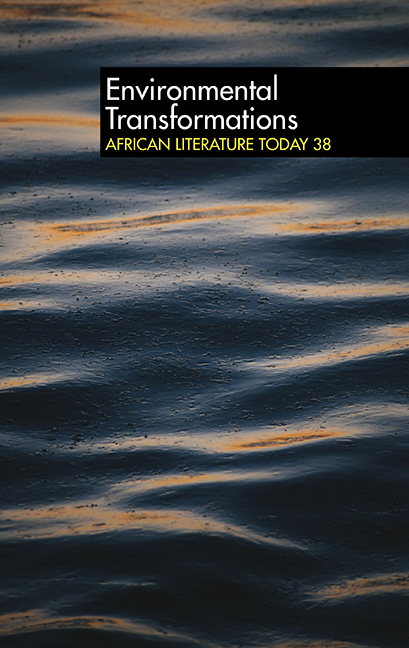Book contents
- Frontmatter
- Contents
- Notes on Contributors
- Introduction: Itinerariesof African Ecocriticism and Environmental Transformations in African Literature
- Literary Totemism and its Relevance for Animal Advocacy: A Zoocritical Engagement with Kofi Anyidoho’s Literary Bees
- Reading for Background: Suyi Davies Okungbowa’s David Mogo, Godhunter and ‘the end of the world as we know it’
- Poetics of Landscape: Representation of Lagos as a ‘Modernizing’ City in Nigerian Poetry
- Poetic Style and Anthropogenic Ecological Adversity in Steve Chimombo’s Poems
- Female Autonomy in Kaine Agary’s Yellow-Yellow
- Local Collisions: Oil on Water, Postcolonial Ecocriticism, and the Politics of Form
- ‘It is the Writer’s Place to Stand with the Oppressed’: Anthropocene Discourses in John Ngong Kum Ngong’s Blot on the Landscape and The Tears of the Earth
- Black Atlantic Futurism, Toxic Discourses and Decolonizing the Anthropocene in Nnedi Okorafor’s The Book of Phoenix
- Readings into the Plantationocene: From the Slave Narrative of Charles Ball to the Speculative Histories of Octavia Butler and Nnedi Okorafor
- INTERVIEW
- LITERARY SUPPLEMENT
- TRIBUTE
- REVIEWS
Introduction: Itinerariesof African Ecocriticism and Environmental Transformations in African Literature
Published online by Cambridge University Press: 07 November 2020
- Frontmatter
- Contents
- Notes on Contributors
- Introduction: Itinerariesof African Ecocriticism and Environmental Transformations in African Literature
- Literary Totemism and its Relevance for Animal Advocacy: A Zoocritical Engagement with Kofi Anyidoho’s Literary Bees
- Reading for Background: Suyi Davies Okungbowa’s David Mogo, Godhunter and ‘the end of the world as we know it’
- Poetics of Landscape: Representation of Lagos as a ‘Modernizing’ City in Nigerian Poetry
- Poetic Style and Anthropogenic Ecological Adversity in Steve Chimombo’s Poems
- Female Autonomy in Kaine Agary’s Yellow-Yellow
- Local Collisions: Oil on Water, Postcolonial Ecocriticism, and the Politics of Form
- ‘It is the Writer’s Place to Stand with the Oppressed’: Anthropocene Discourses in John Ngong Kum Ngong’s Blot on the Landscape and The Tears of the Earth
- Black Atlantic Futurism, Toxic Discourses and Decolonizing the Anthropocene in Nnedi Okorafor’s The Book of Phoenix
- Readings into the Plantationocene: From the Slave Narrative of Charles Ball to the Speculative Histories of Octavia Butler and Nnedi Okorafor
- INTERVIEW
- LITERARY SUPPLEMENT
- TRIBUTE
- REVIEWS
Summary
The geography of African ecocriticism has shifted considerably since William Slaymaker published his ‘Ecoing the Other(s)’ in 2001 and Anthony Vital's ‘Toward an African Ecocriticism’ appeared in 2008. Published in PMLA, Slaymaker's piece explains the slow response of African literary critics to environmental concerns. In his words, ‘there is no rush by African literary and cultural critics to adopt ecocriticism or the literature of the environment as they are promulgated from many of the world's metropolitan centers’ (132). Appearing seven years later, the title of Vital's work on J. M. Coetzee's Life & Times of Michael K suggests the continuing relevance of Slaymaker's observation. Marking the yet to come, the ‘toward’ of Vital's title prepares for the arrival of an African ecocriticism, an arrival that the essay anticipates by proposing methodological principles for an ecocriticism with African inclinations. One such principle, according to Vital, is that ‘ecocriticism, if it is to pose African questions and find African answers, will need to be rooted in local (regional, national) concern for social life and its natural environment’ (88).
Writing this introduction in January 2020, we can report the arrival of an African ecocriticism that has heeded Vital's recommendation as well as the quick maturation of this subfield. To put it succinctly, the field is growing rapidly as there is now a rush to adopt ecocriticism in African literary and cultural studies. The fact that Slaymaker's position is now dated is testament to the growing body of works in African ecocriticism, many of them published in the world's metropolitan centers while others are developed and published within Africa. In fact, one such book won the 2019 Best Ecocriticism Book of the Association for the Study of Literature and Environment (Iheka 2018). Another African-themed monograph was a finalist in the 2015 edition of the prize (Caminero-Santangelo 2014).
These books and other studies in African ecocriticism recognize the interconnection of colonialism with resource extraction and ecological degradation, thereby validating Bonnie Roos and Alex Hunt's claim that ‘any postcolonial critique must be thoroughly ecocritical at the same time’ (2010: 3).
- Type
- Chapter
- Information
- ALT 38 Environmental TransformationsAfrican Literature Today, pp. 1 - 10Publisher: Boydell & BrewerPrint publication year: 2020

